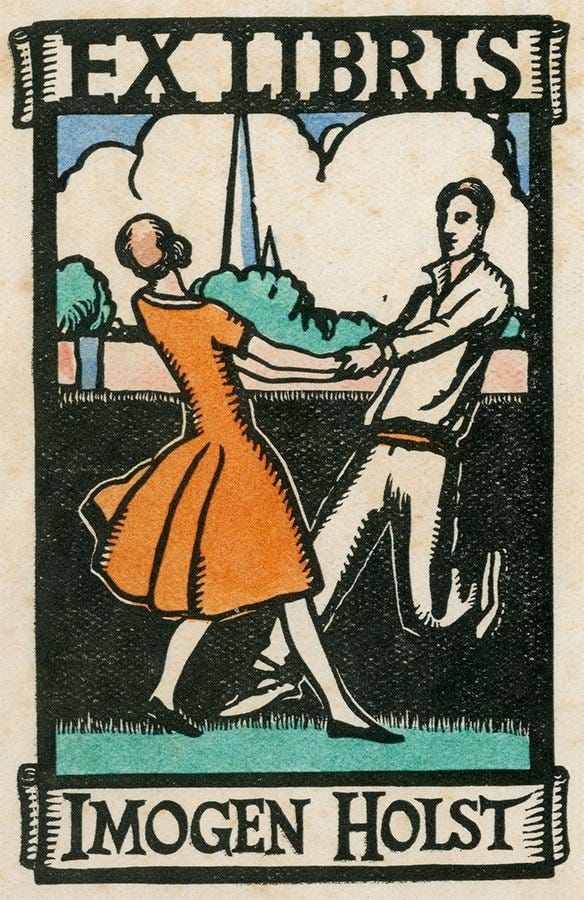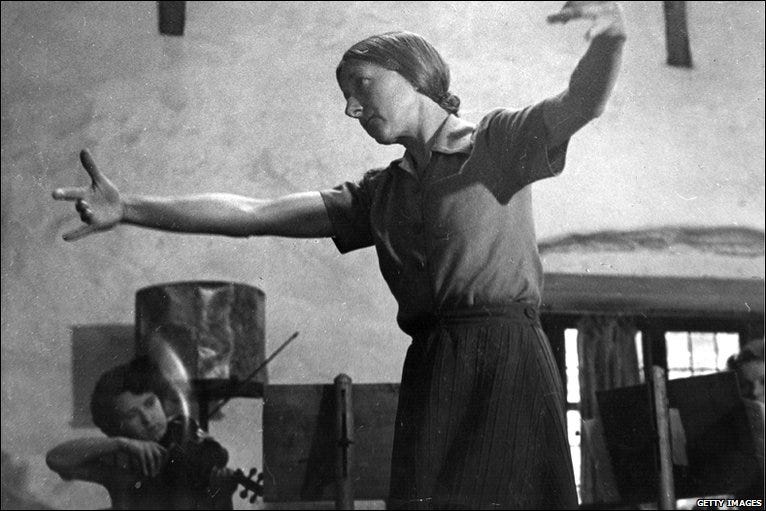I am thinking about …
the life and work of Imogen Holst.
I recently saw the play Ben and Imo, by Mark Ravenhill, which portrays Benjamin Britten and Imogen Holst working together on Britten’s opera Gloriana for the 1953 Coronation. Gloriana was, as Britten predicted, a flop. However, the play that captures its origins proves to be a captivating and understated theatrical gem (The Orange Tree Theatre will stream the production in May 2025 if you’d like to see it.)
I had to read up on Imogen, the daughter of Gustav Holst, and learned more about what a powerhouse of a woman she was - a professional musician, inspired teacher, and a great champion of the amateur arts. A fascinating artist and seemingly an amazing human being.
Composer, teacher, conductor, arranger, dancer and creator of creative communities, big and small, Holst was a tireless advocate of music, whether performed by amateurs or professionals, in pubs or concert halls. To her, music could, and should, be played by all.
She was born and grew up down the road from where I currently live, in Barnes (London), and, after graduating from the Royal College of Music, went on a year-long Grand Tour of Music around Europe (on a £100 travelling grant), then toured Canada as a member of the English Folk Dance Society. In 1940 she joined the morale-boosting initiative Council for the Encouragement of Music and the Arts (CEMA) which had been founded that year to support the arts during World War II. Holst travelled around southwest England, on a bike and a shoestring budget, following the rather vague direction “to go where we liked and do what we liked when we got there”1.
She later worked at Dartington (a progressive school and crafts community in Devon, which had been founded in 1925 by Leonard and Dorothy Elmhirst, who were aiming to create an ideal community, running arts projects as well as initiatives in progressive education.) There she established a course, initially designed to train young women to organise amateur orchestras and musical events in rural communities, which later developed into a music department that was way ahead of its time.
A former student wrote of her:
“I have never met anyone like her before – she danced about in her muted cotton skirt and blouse, woolly cardigan, woven shoulder bag, with her sandy hair drawn tightly back in a small knob, her pale face animated with her humorous eyes. I was completely captured by her unique, charismatic personality and it was the beginning of a love which all of us had for her ever after.”2
Holst then moved on to Aldeburgh to initially work as Britten’s music assistant. She later became Artistic Director of the Aldeburgh Festival from 1956 to 1977 - a festival that embodied the Arts Council’s postwar goals: regional outreach, artistic excellence, and a blend of professional and amateur involvement.
(Today, crippling amount of red tape, combined with the Arts Council's current and controversial 'Let's Create' strategy, makes applying for funding feel less like 'going where we like' and more like navigating a landscape of self-censorship - the right balance seems to be missing.)
Holst’s life and work seem to reflect the post–Second World War hope for a new societal era in Britain - marked, amongst other milestones - by the creation of the NHS (founded in 1948 as part of the broader postwar welfare state reforms) and in the formation of the Arts Council in 1946 (which evolved from her former employer, the wartime Council for the Encouragement of Music and the Arts).
Fittingly therefor, Holst’s home in Aldeburgh was the work of Jim and Betty Cadbury-Brown - - the same architects who helped shape the iconic Southbank site for the 1951 Festival of Britain. This Festival was a celebration of British arts, architecture, science and technology, of progress and recovery in the post-World War II era. It was a major national event designed to uplift and inspire a country that had endured the hardship of war, demonstrating the country's potential for renewal.
Imogen’s rent consisted of a crate of wine for the couple at Christmas and a supply of Aldeburgh Festival tickets. I mean!
I am listening …
to this recently published recording of music by Imogen Holst on NMC.
Alice Farnham, the BBC Concert Orchestra and BBC Singers do affectionate homage to this interesting music, to Imogen Holst’s special legacy, her creative individuality and her significant, often uncelebrated contribution to this country’s musical development. This recording should bring a fresh and just reappraisal of her talent and insight, and, more importantly, her neglected abilities as a composer. (Grammophone)
Thanks for reading! I hope you enjoy my backstage ramblings. If you do, I’d really appreciate your support by liking, commenting, sharing or forwarding the email to someone you think might enjoy it, too. You can also buy me a coffee to help fuel future posts!
Thank you so much and till next time,
Kirsten
Making Music, no.2, October 1946
https://www.dartington.org/imogen-holst/





